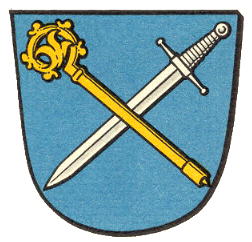Elsoff: Difference between revisions
Knorrepoes (talk | contribs) m (Text replacement - ". ===Origin/meaning===" to ". |- |'''English''' | {{blazon wanted}} |} ===Origin/meaning=== ") |
Knorrepoes (talk | contribs) m (Text replacement - "{{de}} '''" to "{{de}} '''") |
||
| Line 1: | Line 1: | ||
{{de}} | {{de}} | ||
'''ELSOFF''' | '''ELSOFF''' | ||
Revision as of 11:43, 16 July 2022
This page is part of the German heraldry portal Deutsche Wappensammlung |
Heraldry of the World |
|
German heraldry:
|
Selected collector's items from Germany:
|
ELSOFF
State : Rheinland-Pfalz
District (Kreis) : Westerwaldkreis (until 1974 Oberwesterwaldkreis)
Verbandsgemeinde : Verbandsgemeinde Rennerod
| German |
In Blau ein goldener Krummstab gekreuzt mit einem silbernen Schwert. |
| English | No blazon/translation known. Please click here to send your (heraldic !) blazon or translation |
Origin/meaning
The arms were officially granted on ?-? -1971.
There are four different 17th and 18th century seals known of Elsoff, the oldest from the first quarter of the 17th century. All show the same design, a bishop holding a crosier and standing behind two small shields with a lion. The two shields are most likely the coats of arms of Nassau (as in two seals there are indications of the billets that are part of the Nassau arms), and of Hessen.
Elsoff became a possession of the counts of Nassau in 1337 and in 1479 of Hessen. From 1557-1803 it was jointly ruled by Nassau and Hessen, explaining the two shields.On two seals the bishop is also holding a sword. This may be an indication that the bishop may represent both patron saints of the local church (St.Peter as bishop, St. Paul with the sword). In 1956 the above arms were designed with only the crosier and sword for the two saints in the main colours of Nassau and Hessen. These arms were granted in 1971.
Contact and Support
Partners:
Your logo here ?
Contact us
© since 1995, Heraldry of the World, Ralf Hartemink 
Index of the site
Literature : Hessisches Wappenbuch, 1956












